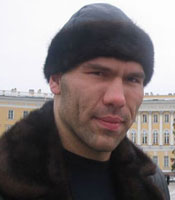| BoxingTalk Story |
29/10/2006
 Imagine the case of a small-time manager who signs an unknown boxer to a contract, then watches that boxer go on to become a heavyweight champion, but winds up losing all of his rights to represent the boxer because the contract violated one of the most basic principles of the sport. That nightmare scenario came true last week for one Joseph O'Donnell, who years ago signed a then-unknown Russian boxer named Nicolay Valuev. After Valuev fought once in the United States, a 2001 win over George Lineberger in which the seven-footer was promoted more as a freak show that as a serious prospect, the relationship between O'Donnell and Valuev soured. Valuev went back to his Russia and O'Donnell filed a lawsuit in America soon after. Valuev did not answer the lawsuit, and soon O'Donnell had a default judgment enforcing the contract against Valuev in America. Meanwhile, Valuev kept improving and found his way to Germany in 2003, where Sauerland Event signed him and fed him a steady diet of increasingly difficult heavyweights, building him into a contender and now, the WBA champion. Sauerland retained New Jersey attorney Patrick English to fight the suit, and English came through, first getting the default thrown out in 2004 and then winning a summary judgment motion last week. Last week, Judge Simandle of federal court in New Jersey ruled that O'Donnell could not enforce the contract. The reason? The contract violated rule #1 of boxing: the contract called for O'Donnell and some other companies "to promote and manage" Valuev's fights. While such an arrangement is legal in some countries, it is a strict no-no here in America, and O'Donnell's contract provided that Nevada law would govern. All in all, a very expensive lesson for O'Donnell. - Scott Shaffer
Imagine the case of a small-time manager who signs an unknown boxer to a contract, then watches that boxer go on to become a heavyweight champion, but winds up losing all of his rights to represent the boxer because the contract violated one of the most basic principles of the sport. That nightmare scenario came true last week for one Joseph O'Donnell, who years ago signed a then-unknown Russian boxer named Nicolay Valuev. After Valuev fought once in the United States, a 2001 win over George Lineberger in which the seven-footer was promoted more as a freak show that as a serious prospect, the relationship between O'Donnell and Valuev soured. Valuev went back to his Russia and O'Donnell filed a lawsuit in America soon after. Valuev did not answer the lawsuit, and soon O'Donnell had a default judgment enforcing the contract against Valuev in America. Meanwhile, Valuev kept improving and found his way to Germany in 2003, where Sauerland Event signed him and fed him a steady diet of increasingly difficult heavyweights, building him into a contender and now, the WBA champion. Sauerland retained New Jersey attorney Patrick English to fight the suit, and English came through, first getting the default thrown out in 2004 and then winning a summary judgment motion last week. Last week, Judge Simandle of federal court in New Jersey ruled that O'Donnell could not enforce the contract. The reason? The contract violated rule #1 of boxing: the contract called for O'Donnell and some other companies "to promote and manage" Valuev's fights. While such an arrangement is legal in some countries, it is a strict no-no here in America, and O'Donnell's contract provided that Nevada law would govern. All in all, a very expensive lesson for O'Donnell. - Scott Shaffer